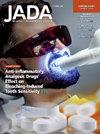Prior incarceration length and edentulism among formerly incarcerated older adults in the United States
IF 3.1
2区 医学
Q1 DENTISTRY, ORAL SURGERY & MEDICINE
引用次数: 0
Abstract
Background
This study investigated the association between prior incarceration length and edentulism among US adults 55 years and older. Analyses explored indirect factors such as wealth, smoking status, mental health, and chronic health conditions that may explain this relationship. In addition, the study analyzed how associations between incarceration and edentulism vary by race and ethnicity.
Methods
The authors used data from the 2012-2014 Health and Retirement Study (unweighted N = 11,630; weighted N = 72,872,877) to assess the relationship between incarceration duration and edentulism through multivariable logistic regression. The Karlson-Holm-Breen method evaluated indirect effects, and multiplicative interaction terms examined variations by race and ethnicity.
Results
Net of control variables analyses showed a positive association between having been incarcerated for more than 1 month and higher odds of edentulism. However, this association was rendered statistically nonsignificant after accounting for wealth, current smoking status, mental health, and chronic disease. Collectively, wealth and smoking explained approximately 60% of the association between prior incarceration length and edentulism. Racial moderation models indicated that longer incarceration times increased edentulism likelihood in non-Hispanic Whites specifically.
Conclusions
To the authors’ knowledge, this is the first study on the association between prior incarceration length and edentulism among older adults. Study findings indicated the relationship between incarceration and edentulism was explained by higher wealth and current smoking status.
Practical Implications
These findings highlight the need for adequate access to oral health care services for formerly incarcerated older adults to improve oral health and enhance their overall health and quality of life
美国曾被监禁的老年人之前的监禁时间和牙齿缺失情况。
背景:本研究调查了美国 55 岁及以上成年人之前的监禁时间与镶牙之间的关系。分析探讨了可能解释这种关系的间接因素,如财富、吸烟状况、心理健康和慢性健康状况。此外,该研究还分析了不同种族和族裔的人在监禁和牙齿缺损之间的关系:作者使用了 2012-2014 年健康与退休研究(Health and Retirement Study)的数据(未加权 N = 11,630; 加权 N = 72,872,877 ),通过多变量逻辑回归评估了监禁时间与拔牙之间的关系。Karlson-Holm-Breen 方法评估了间接效应,乘法交互项则考察了种族和族裔的差异:对控制变量的净分析表明,监禁时间超过 1 个月与较高的牙齿缺损几率之间存在正相关。然而,在考虑了财富、当前吸烟状况、心理健康和慢性疾病等因素后,这种关联在统计学上并不显著。总的来说,财富和吸烟可以解释之前的监禁时间与拔牙之间大约 60% 的关联。种族调节模型表明,监禁时间越长,非西班牙裔白人患牙齿脱落症的可能性就越大:据作者所知,这是第一项关于老年人之前的监禁时间与拔牙之间关系的研究。研究结果表明,较高的财富水平和目前的吸烟状况可以解释监禁与拔牙之间的关系:这些研究结果突出表明,有必要为曾被监禁的老年人提供充分的口腔保健服务,以改善他们的口腔健康,提高他们的整体健康水平和生活质量。
本文章由计算机程序翻译,如有差异,请以英文原文为准。
求助全文
约1分钟内获得全文
求助全文
来源期刊

Journal of the American Dental Association
医学-牙科与口腔外科
CiteScore
5.30
自引率
10.30%
发文量
221
审稿时长
34 days
期刊介绍:
There is not a single source or solution to help dentists in their quest for lifelong learning, improving dental practice, and dental well-being. JADA+, along with The Journal of the American Dental Association, is striving to do just that, bringing together practical content covering dentistry topics and procedures to help dentists—both general dentists and specialists—provide better patient care and improve oral health and well-being. This is a work in progress; as we add more content, covering more topics of interest, it will continue to expand, becoming an ever-more essential source of oral health knowledge.
 求助内容:
求助内容: 应助结果提醒方式:
应助结果提醒方式:


